The Sweet Sorghum Project in Burundi – is a trailblazing initiative with a mission to create a positive impact on the local community and beyond. Our vision revolves around the cultivation and utilization of sweet sorghum, a crop that holds tremendous potential for socio-economic development in the region.


Sweet Sorghum Project in Muyinga Province
Empowering Burundi and Enhancing East African Trade

Sweet Sorghum Project
At the heart of this project lies the desire to uplift the lives of the people of Burundi by tackling poverty head-on. By harnessing the multiple uses of sweet sorghum, including the production of sugar, ethanol, and animal feeds, we are laying the foundation for a brighter and more prosperous future.
Cultivation of Sweet Sorghum
Not only does The Sweet Sorghum Project seek to improve the livelihoods of the local community, but it also aspires to stimulate economic growth throughout the region. By fostering trade and cooperation among the East African States, we envision a network of shared prosperity and collaboration, benefiting nations and communities alike.
Processing for Sugar Production
One of the key objectives of the Sweet Sorghum Project is the establishment of sugar processing units. Sweet sorghum contains high levels of sucrose in its stalks, making it a suitable source of sugar production. The project will set up state-of-the-art processing facilities that extract, refine, and package sugar for local consumption and export. The availability of affordable, locally produced sugar will not only meet domestic demands but also contribute to the growth of the confectionery and beverage industries within the country.
Ethanol Production and Energy Independence
In line with global efforts to promote renewable energy, the Sweet Sorghum Project aims to produce ethanol from sweet sorghum biomass. Ethanol is a clean-burning biofuel that can be used to power vehicles and machinery. By reducing reliance on fossil fuels, the project seeks to mitigate the environmental impact of traditional energy sources and foster energy independence in Burundi. The surplus ethanol can also be sold regionally, creating opportunities for cross-border trade and revenue generation.
Animal Feeds and Livestock Development
Sweet sorghum leaves and by-products from the sugar and ethanol production processes can be utilized as animal feeds. The project will work to improve livestock rearing practices by providing nutritious, locally sourced feed options for farmers. This initiative not only boosts livestock productivity and supports dairy and meat industries but also enhances food security by strengthening the agricultural value chain.
Economic and Trade Implications
The Sweet Sorghum Project is not limited to the local level but envisions broader regional impact. By harnessing the potential of sweet sorghum and producing valuable products like sugar and ethanol, Burundi can position itself as a significant player in the East African trade landscape. The availability of competitively priced, high-quality sugar and ethanol in the region will attract buyers from neighboring countries, leading to increased trade opportunities and cross-border cooperation.
